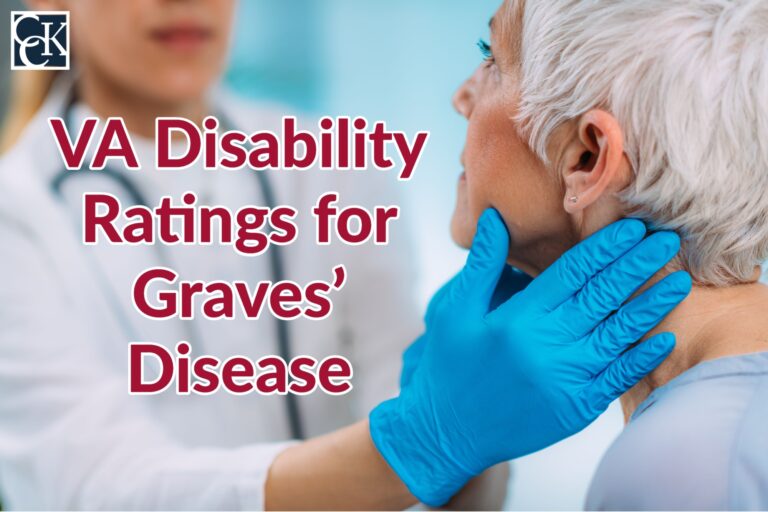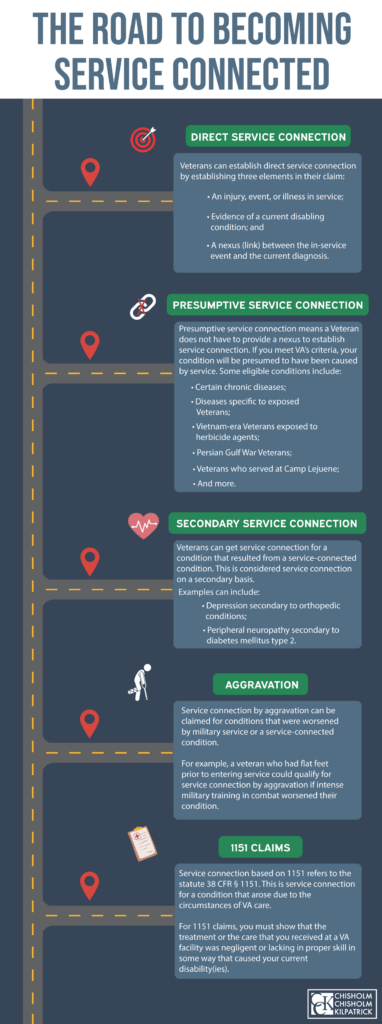VA Disability Ratings for Graves’ Disease

CCK Law: Our Vital Role in Veterans Law
Graves’ disease is an autoimmune disease that can have debilitating side effects. If you are a U.S. military veteran and develop Graves’ disease as the result of your service, you may be eligible for disability benefits from the Department of Veterans Affairs (VA).
Read on to learn more about Graves’ disease, its connection to military service, how to prove service connection for VA compensation purposes, VA ratings, and more.
What Is Graves’ Disease?
Graves’ disease is an autoimmune disorder that causes a person’s immune system to attack their thyroid gland. The thyroid gland is located in the neck and controls the way the body uses energy through thyroid hormones.
With Graves’ disease, the body produces more thyroid hormones than necessary. As such, the speed of many of the body’s functions increases.
Symptoms
- Weight loss
- Fast or irregular heartbeat
- Irritability
- Difficulty sleeping
- Fatigue
- Muscle weakness
- Shaking hands
- Sweating or difficulty tolerating heat
- Frequent bowel movements
- An enlarged thyroid gland, or goiter
How Common Is Graves’ Disease?
According to the National Institute of Diabetes and Digestive and Kidney, Graves’ disease affects nearly 1 in 100 Americans. Additionally, roughly 4 in 5 people in the United States have hyperthyroidism caused by Graves’ Disease.

People who have a family history of Graves’ disease, or Hashimoto’s Disease, may be more likely to develop the condition. A person also may be more likely to develop Graves’ disease if the person has another autoimmune disorder, such as:
- Vitiligo
- Autoimmune gastritis
- Type 1 diabetes
- Rheumatoid arthritis
Additionally, if you use nicotine products, you may be more likely to have Graves’ disease.
Complications of Graves’ Disease
Graves’ disease can cause serious health complications if left untreated. Some serious complications can include:
- Stroke
- Heart failure, or other heart-related problems
- Osteoporosis
- Irregular menstrual cycle
- Infertility
- Eye discomfort
- Vision changes
Graves’ Ophthalmopathy
Graves’ ophthalmopathy is an eye condition which can arise as a complication of Graves’ disease. Specifically, eye symptoms associated with Graves’ ophthalmopathy typically begin within six months of being diagnosed.
Symptoms of Graves’ ophthalmopathy can include:
- Feelings of eye irritation, or grittiness
- Redness
- Inflammation
- Swelling of eyelids
- Excessive tearing
- Dry eyes
- Sensitivity to light
- Bulging eyes
- Double vision
- Decreased eye movement
- Decreased eyelid movement
- Incomplete closure of the eye
- Compression of optic nerve
- Loss of vision, in rare cases
In some cases, steroids, eyelid surgery, eye muscle surgery, or orbital decompression surgery may be necessary to treat Graves’ ophthalmopathy. Other times, treatment may include cold compresses, wearing sunglasses, and using eyedrops.
Graves’ Dermopathy
People with Graves’ disease may also develop certain skin conditions, or Graves’ dermopathy. With Graves’ dermopathy, symptoms may include:
- Reddened skin
- Inflamed skin
- Thickened skin
- Itchy or painful skin
- Different textured skin, such as the skin of an orange peel
Graves’ dermopathy most often affects the shins, but can also affect the ankles, feet, knees, elbows, upper back, neck, forehead, and ears. About 96 percent of people who have Graves’ dermopathy also have Graves’ ophthalmopathy.
Graves’ Disease and Military Service
Graves’ disease is a form of hyperthyroidism, where the thyroid is overactive. Certain chemical exposures that can occur during military service have been proven to cause hyperthyroidism.
Specifically, chemicals such as PBDs, or polybrominated diphenyl ethers, can cause hyperthyroidism. These chemicals are used in substances like flame retardants and pesticides. Therefore, veterans who were exposed to these chemicals during their service may be entitled to service connection for their Graves’ disease.
Additionally, certain medications, like those used to treat depression or PTSD, can affect a person’s thyroid.
Service Connection for Graves’ Disease
Veterans whose Graves’ disease is linked to their military service can apply for service-connection to receive VA disability benefits for their condition. To do so, veterans will need to fill out VA Form 21-526EZ. This form can be submitted to VA in-person at a local Regional Office, online via the EBenefits portal, or via mailing the form to VA’s Evidence Intake Center (PO Box 4444 in Janesville, WI 53547-4444). Veterans may also have a legal representative submit the form on their behalf.

In addition to this form, veterans will need evidence of the following to prove their Graves’ disease claim:
- A current diagnosis of your condition;
- An in-service stressor, event, or injury that caused or aggravated your condition; and
- A nexus, which links your Graves’ disease to your military service
For example, if your Graves’ disease was caused by exposure to toxins, you could submit a current diagnosis, a lay statement which indicates where and when you were exposed to the toxins that you believe caused your condition, and medical evidence which links the condition to the toxins.
Secondary Service Connection
Secondary service connection is a form of service connection for veterans who have a condition that has been caused or aggravated by an already service-connected condition. Some veterans may be eligible for secondary service connection for their Graves’ disease if it was caused or aggravated by another already service-connected condition.
For example, if a veteran is service connected for depression and they take a certain medication to treat their depression, but that medication affects their thyroid and causes Graves’ disease, the veteran may be eligible for secondary service connection. In this case, Graves’ disease would be secondarily service connected to depression.
VA Ratings for Graves’ Disease
VA rates Graves’ disease using 38 CFR § 4.119, VA’s Schedule of Ratings for the Endocrine System. Specifically, VA uses Diagnostic Code 7900, which is for hyperthyroidism, including, but not limited to, Graves’ disease. The ratings are as follows:
- 30% – This rating is given for six months after the initial diagnosis of Graves’ disease.
Following the six-month period, VA will assign a rating based on the residuals or complications of medical treatment. To do this, VA will use the appropriate diagnostic code corresponding to the appropriate body system.
If the veteran also has eye involvement, it can be rated as diplopia (Diagnostic Code 6090), impairment of central visual acuity (Diagnostic Code 6061-6066).
Need Help Getting VA Disability for Graves’ Disease?
If you need assistance fighting a VA denial of Graves’ disease, the accredited representatives at Chisholm Chisholm & Kilpatrick may be able to help. Our team can help gather evidence for your appeal and craft persuasive arguments to help win you the benefits you deserve. Contact our office today for a free case evaluation.
About the Author
Share this Post
